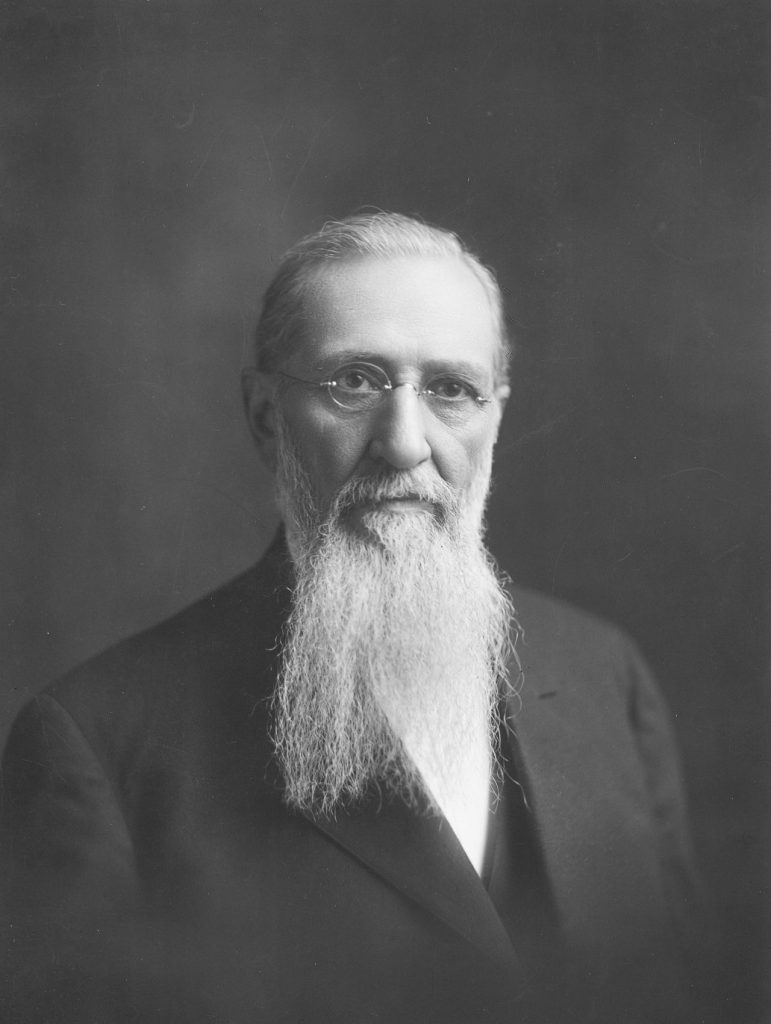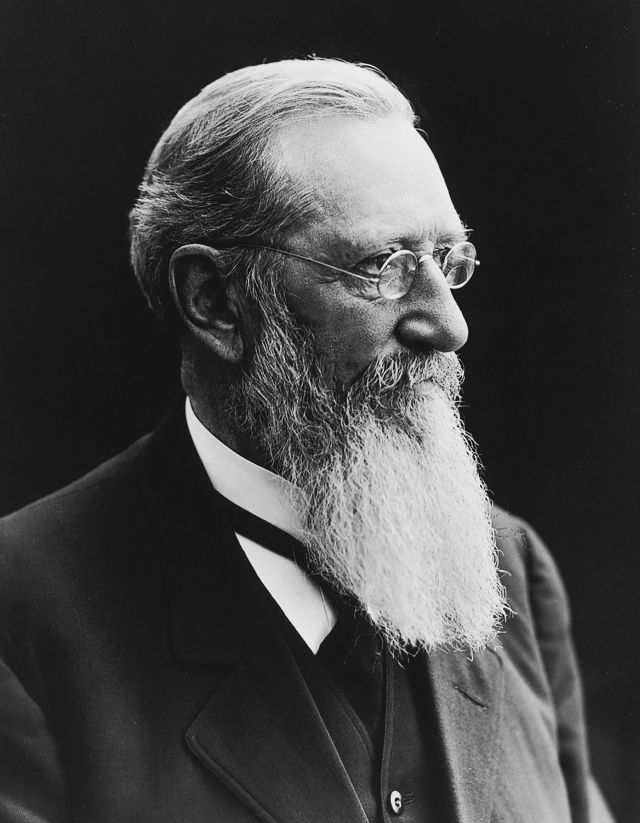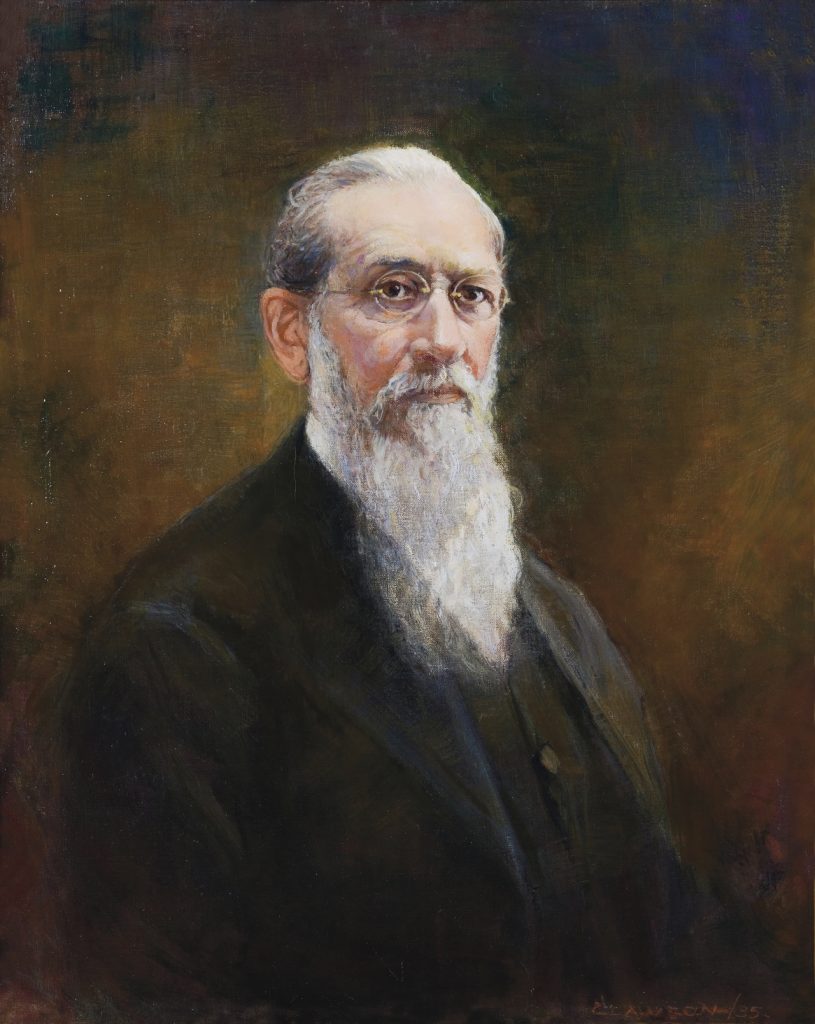Joseph F. Smith
(1838-1918)






By Susan Easton Black
When Joseph F. Smith was only a few months old, his parents’ home in Far West, Missouri, was broken into by a mob. He wrote,
I, being an infant, and lying on the bed, another bed being on the floor, was entirely overlooked by the family during the fright and excitement. So when the mob entered the room where I was, the bed on the floor was thrown on to the other completely smothering me up.1
He survived the ordeal and was taken by his mother, Mary Fielding Smith, across the Mississippi River to Illinois. His childhood days were spent in Nauvoo. After the assassination of his father, Hyrum Smith, and his uncle Joseph Smith, his mother took him from Nauvoo to the Territory of Iowa and then across the plains to the Rocky Mountains.
After the death of his mother in the Salt Lake Valley, Joseph F. was called at age fifteen to serve a mission in the Hawaiian Islands. On that mission, he penned, “I well know that I am young and inexperienced at present, therefore I wish to be humble, prayerful before the Lord, that I may be worthy of the blessings and love of God to protect me at all times.” His prayer was answered both in the islands and as he journeyed home to the Salt Lake Valley. On that journey, drunken men approached him as they spoke of killing Mormons and asked, “Are you a Mormon?” Joseph F. replied, “Yes, siree; dyed in the wool; true blue, through and through.” The surprised man said, “Well, you are the pleasantest man I ever met! Shake, young fellow, I am glad to see a man that stands up for his convictions.”2
The day after Joseph F. arrived in the Salt Lake Valley, he wrote, “I reported myself to President Young and immediately enlisted in the legion (militia) to defend ourselves against the encroachment of a hostile and menacing army. From that time until the proclamation of peace … I was constantly in my saddle.”3 When threats of an impending war subsided, Joseph F. put away his gun and began to till the soil.
It was a mission call to the British Isles and another call to serve in the Hawaiian Islands that kept Joseph F. from having a very successful farm. Nevertheless, he greatly enjoyed sharing the gospel of Jesus Christ wherever he was called to serve. When back home for what Joseph F. had assumed was a brief season, on July 1, 1866, Brigham Young said to him, “Hold on, shall I do as I feel led? I always feel well to do as the Spirit constrains me. It is my mind to ordain Brother Joseph F. Smith to the Apostleship, and to be one of my counselors.”4
Twenty-seven-year-old Joseph F. Smith joined the leading brethren of the Church in the Quorum of the Twelve Apostles and the First Presidency. As the years passed, he served as a counselor to four Church presidents—Brigham Young, John Taylor, Wilford Woodruff, and Lorenzo Snow.
Joseph F. also gave much civic service. He was elected to the House of Representatives for seven consecutive terms. He was elected president of the Constitutional Convention in 1882 and served on the Salt Lake City Council for several terms. His civil duties stopped when a federal government crusade against all Latter-day Saint men participating in the practice of plural marriage forced him to go into exile.
From 1884 to 1891, Joseph F. was in hiding. Of that difficult time in his life, he wrote, “I cannot conceive of anything more contemptible or more execrable than the present and continued attempts of the Federal Officials to blast the peace and break up the sacred relations of husbands and wives, parents and children!” US President Benjamin Harrison granted amnesty to Joseph F. on September 10, 1891. Joseph F. said of his newfound freedom, “I thank God and am grateful to the President of the United States.” After seven years of being in hiding, he was now able to speak in the Salt Lake Tabernacle to the Latter-day Saints without the concern of being arrested. Recalling his first speech, Joseph F. wrote, “I spoke briefly, for I was so overcome by my feelings that I could scarcely restrain them.”5
Joseph F. Smith served as president of The Church of Jesus Christ of Latter-day Saints from 1901 to 1918. Near the end of his administration, his son Hyrum M. Smith, a member of the Quorum of the Twelve Apostles, died. Joseph F. wrote, “My soul is rent asunder. My heart is broken, and flutters for life! O my sweet son, my joy, my hope! I love him still.”6 On October 3, 1918, Joseph F. received a vision of the Savior Jesus Christ visiting the spirits of the dead. A record of his vision was “submitted to the counselors in the First Presidency, the Council of the Twelve, and the Patriarch, and it was unanimously accepted by them” on October 31, 1918 (D&C 138: Introduction).
Joseph F. died from pleuropneumonia just nineteen days after the unanimous affirmation of his vision. A public funeral was not held due to the influenza epidemic that had spread through Salt Lake City. Funeral services were conducted near his open grave. Bishop Charles W. Nibley eulogized, “As a preacher of righteousness, who could compare with him? He was the greatest that I ever heard strong, powerful, clear, appealing.”7
1. Joseph Fielding Smith, comp., Life of Joseph F. Smith, 2nd ed. (Salt Lake City: Deseret Book Co., 1969), 124.
2. Smith, comp., Life of Joseph F. Smith, 180–189.
3. Smith, comp., Life of Joseph F. Smith, 195.
4. Smith, comp., Life of Joseph F. Smith, 227.
5. Smith, comp., Life of Joseph F. Smith, 299–300.
6. Smith, comp., Life of Joseph F. Smith, 474.
7. Smith, comp., Life of Joseph F. Smith, 433.
